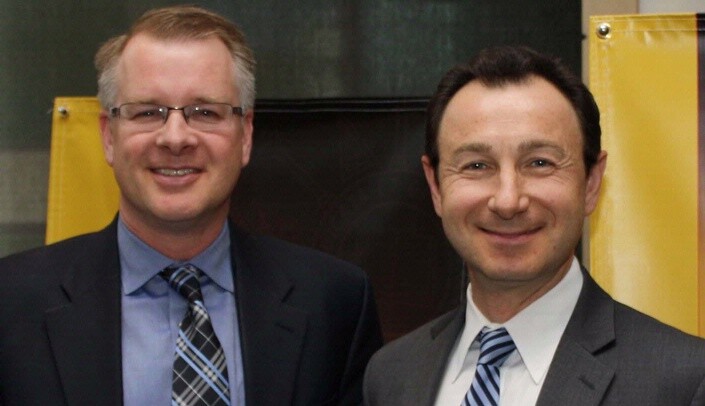
Virtual Incision Corp., a company that sprang from a collaboration between faculty from the University of Nebraska-Lincoln and the University of Nebraska Medical Center, announced Aug. 6 that it had raised $11.2 million of equity financing.
The funding will go toward a feasibility study on the use of the company’s miniaturized surgical robot technology developed by UNL’s Shane Farritor and UNMC’s Dmitry Oleynikov.
Farritor and Oleynikov are longtime partners on the development of miniaturized surgical robots. The two led creation of robots that can be inserted through a tiny incision in the abdomen and perform minimally invasive surgery. The work is expected to significantly reduce a patient’s pain and recovery time.
“Seeing this technology move from an initial concept to the robotics lab and now to the surgical suite where it has the potential to directly benefit patients in a real and tangible way has been very invigorating,” said Farritor, Lederer Professor of Engineering and chief technology officer of Virtual Incision. “We have a great team in place and strong intellectual property that positions us well for success, and I’m excited to see what the future will bring.”
Their work is widely recognized as a model for cross-campus collaboration – in 2014 the University of Nebraska system honored them with its prestigious Innovation, Development and Engagement Award – and resulted in them co-founding Virtual Incision. Oleynikov, professor of surgery at UNMC, is the company’s chief medical officer.
According to Virtual Incision’s Aug. 6 announcement, the capital fundraising was led by Bluestem Capital of Sioux Falls, S.D. The round of financing was oversubscribed with participation from existing investors, including PrairieGold Venture Partners, also of Sioux Falls.
The funds will allow for an assessment of the practicality of the company’s miniaturized surgical robot technology for colon resection, a surgical procedure performed to treat patients with lower gastrointestinal diseases such as diverticulitis, Crohn’s disease, inflammatory bowel disease and colon cancer.
The company’s technology is based on UNL-UNMC research that has been funded by both NASA and the U.S. Army’s Telemedicine and Advanced Technology Research Center.
More than two million patients undergo colon resection procedures globally each year. About two-thirds of these procedures are performed via a completely open surgical procedure involving an 8- to 12- inch incision and up to six weeks of recovery time. Because of the procedure’s complicated nature, existing robot-assisted surgical devices are rarely used for colon resection surgeries, and manual laparoscopic approaches are only used in one-third of cases.
Colorectal and lower gastrointestinal surgical procedures are growing by 14 percent each year, making them the fastest growing surgeries in the country.
Designed to utilize existing tools and techniques familiar to surgeons, Virtual Incision’s robot will not require a dedicated operating room or specialized infrastructure, and, because of its much smaller size, is expected to be significantly less expensive than existing robotic alternatives for laparoscopic surgery. Because of these technological advances, the system could enable a minimally invasive approach to procedures performed in open surgery today.
“The University of Nebraska has always been very supportive of our research,” Farritor said. “Both Dr. Oleynikov and I have been fortunate to be at an institution supportive of cross-disciplinary collaborations.”







